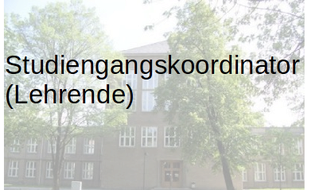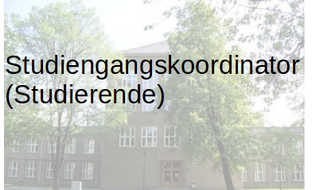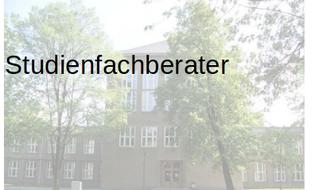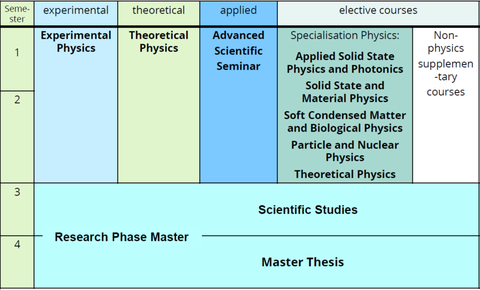Masterstudiengang Physics
Inhaltsverzeichnis
- Willkommen im Masterstudiengang Physics!
- Ziele und besondere Stärken des Masterstudiengangs Physics der TU Dresden
- Aufbau des Masterstudiengangs Physics
- Primäre Lehrsprache Englisch
- Prüfungsformen
- Voraussetzungen und Anforderungen
- Attraktivität des Physik-Standorts Dresden
- Weitere Angebote der Fakultät Physik und der TU Dresden
- Eignungsfeststellung, Bewerbung, Immatrikulation und Studiendokumente
- Informationen zum Studienstart
- Studiengangskoordinatoren
- Studienfachberater
Willkommen im Masterstudiengang Physics!
Der konsekutive Masterstudiengang Physics wird an der TU Dresden seit dem Wintersemester 2012/13 angeboten. Er ist modular aufgebaut und hat eine Regelstudiendauer von 4 Semestern. Das Studium kann sowohl zum Wintersemester als auch zum Sommersemester aufgenommen werden.
WICHTIG: Seit dem Wintersemester 2025/2026 muss parallel zur Bewerbung ein Antrag auf Eignungsfeststellung gestellt werden.
In der Physik geht es darum, herauszufinden, was die Natur möglich macht; Dresden bietet Ihnen neue Möglichkeiten im Leben. Steigen Sie ein in den internationalen Masterstudiengang "Physik" der TU Dresden. © Fakultät Physik, TU Dresden; Film: Biermann-Jung Kommunikation & Film
Ziele und besondere Stärken des Masterstudiengangs Physics der TU Dresden
- Formulieren, Analysieren und Lösen komplexer physikalischer Probleme und Aufgabenstellungen durch Verknüpfen der Kenntnisse aus verschiedenen Teilgebieten der Physik;
- Vertiefung des Einblicks in innerphysikalische Zusammenhänge sowie in Zusammenhänge mit wissenschaftlichen Nachbardisziplinen;
- Vertiefungsmöglichkeiten in 5 physikalischen Themengebieten und einer 1-jährigen Forschungsphase mit Masterarbeit
Aufbau des Masterstudiengangs Physics
- 4 Semester Regelstudienzeit
- Beginn im Winter- oder Sommersemester
- 5 Vertiefungsrichtungen:
- Angewandte Festkörperphysik und Photonik
- Festkörper- und Materialphysik
- Weiche kondensierte Materie und biologische Physik
- Teilchen- und Kernphysik
- Theoretische Physik
- Pflichtmodule „Experimentelle Physik“ und „Theoretische Physik“ mit Vermittlung der jeweiligen Schlüsselkonzepte in Vorlesungen und Tutorien: Verknüpfung verschiedener Bereiche der experimentellen Physik, wie Atom-, Molekül-, Festkörper-, Kern- und Teilchenphysik, sowie von Methoden und Konzepten der theoretischen Physik
- Hauptseminar mit aktuellen Themenangeboten der modernen Physik
- Nichtphysikalisches Wahlpflichtfach in 12 Themenbereichen: Mathematik, Biomathematik, Chemie, Biologie, Molekularbiologie, Informatik, Philosophie, Elektrotechnik, Maschinenbau, Materialwissenschaft, Betriebswirtschaftslehre, Volkswirtschaftslehre
- Möglichkeit eines Auslandsaufenthalts z.B. im ersten Sommersemester
- 1-jährige Forschungsphase mit Wissenschaftlichem Arbeiten und Masterarbeit Das Modul Wissenschaftliches Arbeiten ist Einarbeitungs- und Vorbereitungsphase für die Masterarbeit. In diesem Modul und der Masterarbeit wird ein gemeinsames, übergreifendes Forschungsthema bearbeitet.
Primäre Lehrsprache Englisch
- Die Lehrsprache im Masterstudiengang Physics ist primär Englisch.
- Die Prüfungssprache in den physikalischen Seminaren, Praktika, Haupt- und Vertiefungsfächern ist je nach Wahl der Studierenden Englisch oder Deutsch.
- Die Lehr- und Prüfungssprache der nicht-physikalischen Nebenfächer ist Englisch oder Deutsch und richtet sich nach dem aktuellen Angebot des Nebenfachkatalogs.
Prüfungsformen
- Mündliche Prüfungen in den Modulen „Experimentelle Physik“ und „Theoretische Physik“
- Referate und Vorträge im Hauptseminar und dem Wissenschaftlichen Arbeiten
- Mündliche Prüfung und Portfolio schriftlicher Problembearbeitungen (z.B. Protokolle im Laborpraktikum) im Vertiefungsgebiet
- Weitere unterschiedliche Prüfungsformen je nach Wahl des nichtphysikalischen Wahlpflichtfachs
- Schriftliche Masterarbeit
Voraussetzungen und Anforderungen
- Berufsqualifiziernder Hochschulabschluss (z.B. Bachelor of Science) oder ein Abschluss einer staatlichen oder staatlich anerkannten Berufsakademie im Fachgebiet Physik oder in einem Studiengang mit eng verwandter fachlicher Ausrichtung
- Fachkenntnisse der Grundlagen der experimenteller und theoretischer Physik und von angewandten mathematischen Methoden äquivalent zu den Inhalten im Bachelorstudiengang Physik der TU Dresden, d.h. fundierte Kenntnisse
- der Grundlagen der Experimentellen Physik in den Themenbereichen Mechanik, Wärmelehre, Elektromagnetismus, Optik, Quantenphysik, Atom- und Molekülphysik sowie in den Themenbereichen Festkörperphysik oder Kern- oder Teilchenphysik oder Biophysik,
- der Grundlagen der Theoretischen Physik in den Themenbereichen Theoretische Mechanik, Theoretische Elektrodynamik, Theoretische Quantenmechanik sowie in den Themen-bereichen Statistische Physik oder Theoretische Thermodynamik,
- der damit verbundenen mathematischen Grundlagen und
- Erfahrungen im physikalischen Praktikum, einschließlich Programmierkenntnissen
- Englischkenntnisse auf dem Niveau B2 des Gemeinsamen Europäischen Referenzrahmens für Sprachen, mit Nachweis z.B. durch
- Allgemeine oder fachgebundene Hochschulreife mit einem in Englisch abgeschlossenen Grund- oder Leistungskurs (oder vergleichbare Niveaustufen) oder eine vollständig in englischer Sprache abgelegte Hochschulreife, oder
- Zeugnis über einen vollständig in englischer Sprache abgelegten Hochschulabschluss, oder
- Ergebnis eines international angebotenen Tests (beispielsweise IELTS: mindestens 5,5 in allen Teilaspekten, TOEFL internetbasiert mit mindestens 72 Punkten gesamt und mindestens 17 Punkten in jedem Teilaspekt, UNIcert II).
- Selbstständigkeit und Motivation für das Physikstudium im Masterprogramm der TU Dresden
Attraktivität des Physik-Standorts Dresden
- 5 forschungsstarke Institute der Fakultät Physik
- Zahlreiche außeruniversitäre Institute der Max-Planck-Gesellschaft, der Leibnitz-Gemeinschaft, Frauenhofer-Institute, sowie ein Helmholtz-Zentrum
- Enge Verbindung von Lehre und Forschung
- Interdisziplinäre Zusammenarbeit mit anderen naturwissenschaftlichen Fachrichtungen, mit den Fakultäten Informatik, Elektrotechnik, Maschinenwesen und Philosophie sowie mit den zentralen Einrichtungen ZIH (Hochleistungsrechenzentrum) und dem Center for Molecular and Cellular Bioengineering (CMCB) .
- Zahlreiche Möglichkeiten für Masterarbeiten und wissenschaftliche Praktika
Weitere Angebote der Fakultät Physik und der TU Dresden
- Mentoringprogramm des Fachschaftsrats Physik
- Studienberatung der Fakultät und zentrale Studienberatung
- Sprachkurse, Schreibwerkstätten, Weiterbildungsangebote
- Career Service
- Uni-Sport
- u.v.m.
Eignungsfeststellung, Bewerbung, Immatrikulation und Studiendokumente
Der praktische Ablauf von Bewerbung und Eignungsfeststellung sind auf der Informationsseite der Fakultät zur Bewerbung und zum Antrag auf Eignungsfeststellung des Masterprogramms Physics sowie im zentralen Studieninformationssystem (SInS) zum Master Physics zusammengestellt. Alle formalen Regelungen zu Zugangsvoraussetzungen, Studienablauf, Modulbeschreibungen, und die Prüfungsordnung finden sich in den Studiendokumenten.
WICHTIG: Seit dem Wintersemester 2025/2026 muss parallel zur Bewerbung ein Antrag auf Eignungsfeststellung gestellt werden.
Allgemeine Informationen zum Studiengang werden auch im DAAD "International Programmes" Portal vorgestellt: Physics Master's Programme Dresden.
Informationen zum Studienstart
Zu Beginn des Winter- und Sommersemesters finden Informations- und Einführungsveranstaltungen zum Masterstudiengang Physik und zu allen Studiengängen der Fakultät Physik statt.
Studiengangskoordinatoren
 © jb
© jb
Studiengangskoordinator Physik Master (Lehrende): Prof. Dr. Arno Straessner
Eine verschlüsselte E-Mail über das SecureMail-Portal versenden (nur für TUD-externe Personen).
Besuchsadresse:
Andreas-Schubert-Bau (ASB), Raum 428
01062 Dresden
Postadresse:
Technische Universität Dresden
Studiendekan Physik
Fakultät Physik
01062 Dresden
 © jb
© jb
Peter Maximilian Fischer
Studentische Studiengangskoordinatorin
Eine verschlüsselte E-Mail über das SecureMail-Portal versenden (nur für TUD-externe Personen).
Studienfachberater
 © jb
© jb
Dr. Mathias Dörr
Besucheradresse:
Recknagel-Bau
(ehemals Physikgebäude), Raum D208
None
Öffnungszeiten:
- Donnerstag:
- 14:00 - 16:00

